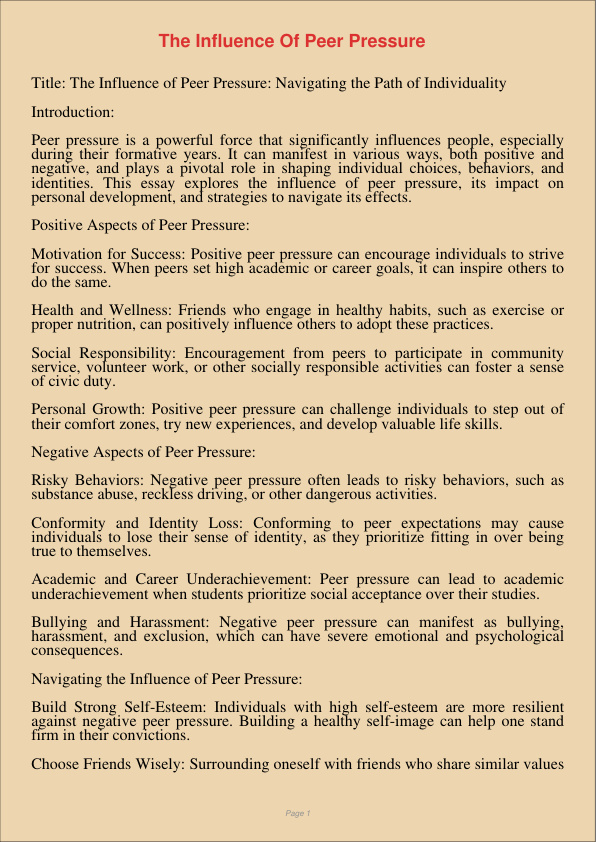
Title: The Influence of Peer Pressure: Navigating the Path of Individuality
Introduction:
Peer pressure is a powerful force that significantly influences people, especially during their formative years. It can manifest in various ways, both positive and negative, and plays a pivotal role in shaping individual choices, behaviors, and identities. This essay explores the influence of peer pressure, its impact on personal development, and strategies to navigate its effects.
Positive Aspects of Peer Pressure:
Motivation for Success: Positive peer pressure can encourage individuals to strive for success. When peers set high academic or career goals, it can inspire others to do the same.
Health and Wellness: Friends who engage in healthy habits, such as exercise or proper nutrition, can positively influence others to adopt these practices.
Social Responsibility: Encouragement from peers to participate in community service, volunteer work, or other socially responsible activities can foster a sense of civic duty.
Personal Growth: Positive peer pressure can challenge individuals to step out of their comfort zones, try new experiences, and develop valuable life skills.
Negative Aspects of Peer Pressure:
Risky Behaviors: Negative peer pressure often leads to risky behaviors, such as substance abuse, reckless driving, or other dangerous activities.
Conformity and Identity Loss: Conforming to peer expectations may cause individuals to lose their sense of identity, as they prioritize fitting in over being true to themselves.
Academic and Career Underachievement: Peer pressure can lead to academic underachievement when students prioritize social acceptance over their studies.
Bullying and Harassment: Negative peer pressure can manifest as bullying, harassment, and exclusion, which can have severe emotional and psychological consequences.
Navigating the Influence of Peer Pressure:
Build Strong Self-Esteem: Individuals with high self-esteem are more resilient against negative peer pressure. Building a healthy self-image can help one stand firm in their convictions.
Choose Friends Wisely: Surrounding oneself with friends who share similar values and interests can mitigate the impact of negative peer pressure.
Communication: Open and honest communication with friends and family members can provide support and guidance in making wise decisions.
Assertiveness and Peer Resistance Skills: Learning to say “no” and assert one’s own choices is a valuable skill for resisting negative peer pressure.
Individuality and Self-Expression: Encouraging self-expression and embracing one’s uniqueness can promote resilience against the pressure to conform.
Conclusion:
Peer pressure is a ubiquitous and influential force in the lives of individuals, particularly during adolescence and young adulthood. It can lead to both constructive and detrimental outcomes, shaping values, decisions, and behaviors. Recognizing the distinction between positive and negative peer pressure and equipping individuals with the skills to navigate its influence is essential for personal growth and development.
Ultimately, the ability to maintain one’s individuality while appreciating the benefits of social interaction is crucial. Learning to balance the impact of peer pressure by making informed and autonomous choices is a valuable life skill that leads to personal growth, self-confidence, and a more authentic and fulfilling life.
「真诚赞赏,手留余香」
真诚赞赏,手留余香
使用微信扫描二维码完成支付
